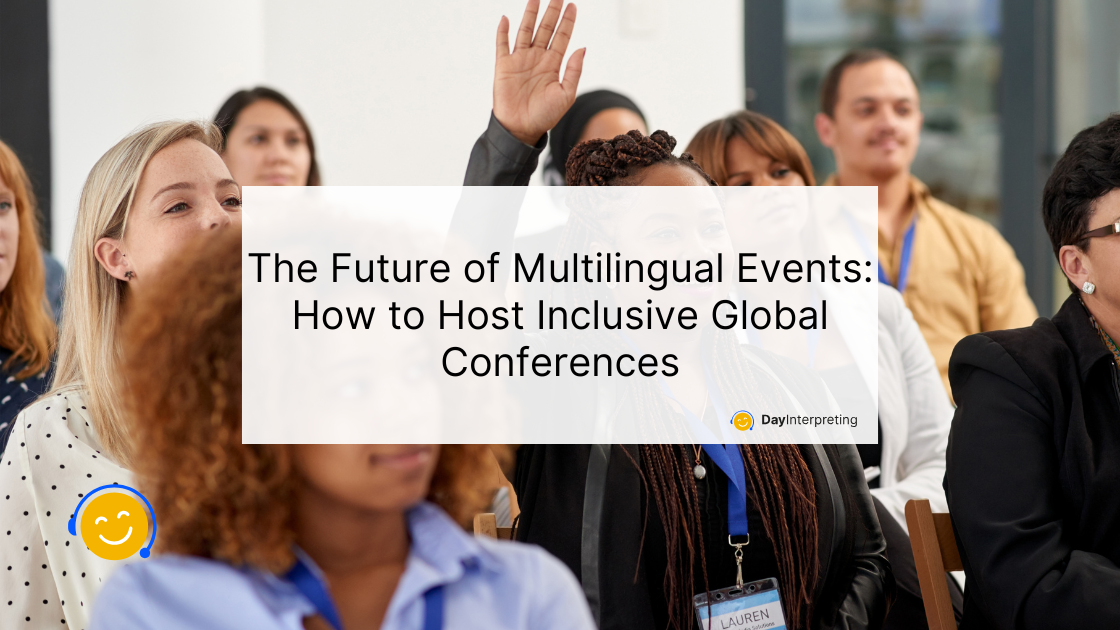Today, more than ever, people from all corners of the globe come together for conferences, meetings, and events. These gatherings are essential for sharing ideas, solving problems, and building networks across cultures. But when people speak different languages, how do you make sure everyone feels included? The answer lies in hosting multilingual events—gatherings that provide access to information and conversation in multiple languages.
In this article, we’ll explore how the future of global conferences is changing and offer tips on how to create inclusive, multilingual events that bring people together from all over the world.
Why Multilingual Events Matter
Imagine attending a conference where everyone is speaking a language you don’t understand. Wouldn’t it be frustrating? You might miss important points, struggle to connect with others, and feel left out. That’s how many people feel when events are hosted in only one language. In fact, almost 75% of the world’s population doesn’t speak English fluently.
As the world becomes more connected, hosting events that are accessible to people of various language backgrounds is critical. Multilingual events allow people to share their ideas and feel more comfortable, no matter what language they speak.
But how can you make sure your conference is inclusive and engaging for a global audience? Let’s dive into the future of multilingual events.
The Rise of Technology in Multilingual Events
Real-Time Translation Tools
The biggest game-changer for multilingual events is technology. Real-time translation tools have become incredibly advanced. They allow speakers of different languages to communicate almost instantly. Tools like translation apps, software, and earpieces that translate spoken language into the listener’s native tongue are becoming more common.
These technologies use artificial intelligence to provide instant subtitles, translating what someone is saying as they speak. This means that attendees can follow along, even if the presentation is not in their preferred language.
AI-Powered Interpretation
AI-powered interpretation services go a step further. They use advanced algorithms to understand and interpret speech in various languages in real time. For example, if you’re hosting a virtual conference with people from China, Brazil, and France, you can use AI-powered tools to automatically translate the spoken language into Chinese, Portuguese, and French.
This technology isn’t limited to virtual events—it’s also available in face-to-face conferences, helping to make communication smoother and more inclusive.
Practical Tips for Hosting Multilingual Conferences
To host an inclusive global event, you need more than just technology. Here are some practical tips to ensure everyone feels welcome and understood.
1. Plan for Multiple Languages
When planning your event, consider the languages your audience speaks. You might need to hire interpreters or translators for key presentations. Offering translation in standard languages like English, Spanish, Chinese, French, and Arabic can cover a wide range of attendees. Make sure to announce in advance which languages will be available to help attendees prepare.
2. Use Multilingual Event Platforms
If you’re hosting a virtual event, consider using event platforms that support multiple languages. Many virtual meeting platforms now come with features like multilingual chat rooms, live translations, and language-specific breakout rooms. These tools allow participants to choose their preferred language, making the event more engaging and accessible.
3. Create Bilingual or Multilingual Content
One of the most important things to do is to ensure your content is available in multiple languages. This includes presentations, handouts, and even the event website. Translate the agenda and important documents beforehand so that attendees can easily understand the schedule and the event’s goals.
For live presentations, offering bilingual slides or subtitles is a great way to ensure all participants can follow along.
4. Encourage Cultural Awareness
Language isn’t the only barrier in global conferences—culture plays a role too. When you have people from different countries, it’s essential to be aware of cultural differences in communication. Some cultures prefer more formal language, while others may be more casual. Some cultures value silence in conversations, while others encourage active back-and-forth dialogue.
Encouraging speakers and attendees to be aware of these differences and to respect cultural communication styles will create a more inclusive environment.
The Benefits of Multilingual Events
Hosting a multilingual event has many benefits both for the organizers and the attendees.
1. Reach a Larger Audience
By offering your event in multiple languages, you can reach a much larger audience. People who may have skipped your conference because of language barriers will now feel included and willing to attend, opening up your event to a truly global crowd.
2. Boost Engagement
When attendees feel included, they are more likely to engage with the content. This leads to better discussions, more networking opportunities, and overall richer conversations. By catering to multiple languages, you’re making it easier for people to share ideas and connect.
3. Improve Global Collaboration
Multilingual events can spark collaboration across borders. When people can speak and listen in their native language, they feel more comfortable sharing their thoughts. This can lead to innovative ideas and partnerships between different countries and cultures.
4. Build Long-Lasting Connections
Language can be a powerful bridge between cultures. When you create an event where everyone feels like they can communicate freely, it’s easier for people to form relationships. These connections can last long after the event is over, strengthening international networks and collaboration.
Conclusion: The Future of Multilingual Conferences
The future of global events is undoubtedly multilingual. As technology continues to improve, making language barriers smaller and smaller, the world of conferences and meetings will become more inclusive. Real-time translation tools, AI-powered interpretation, and language-specific event platforms are just a few of the innovations leading the way.
By planning for multiple languages and encouraging cultural awareness, you can host an event that reaches a global audience and creates lasting connections. The world is getting smaller, and multilingual events are the key to ensuring that everyone, no matter where they’re from or what language they speak, feels welcome and engaged.
So, next time you plan a conference, think globally, and speak the language of inclusion!





0 Comments